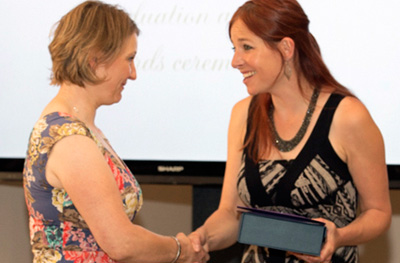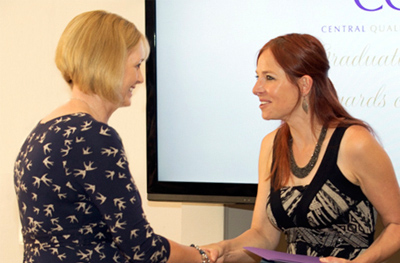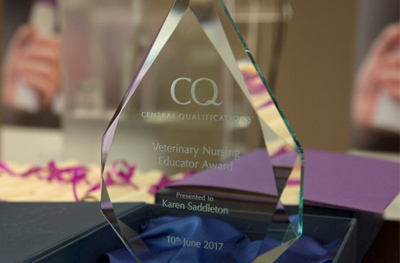- ‘Kirsty is a fantastic teacher at the college, you can tell she is passionate about teaching.’
- ‘She relates everything to “in practice” and dedicates her time to ensuring her students understand.’
- ‘She is never too busy to help her students.’
- ‘Brilliant tutor, very experienced, a fun and understanding person and I'm not sure I would have passed the course without her.’

Kirsty Gwynne and Karen Saddleton were presented with the awards by Professor Alice Roberts during the CQ Graduation and Awards Ceremony at Central Hall, Westminster, on Saturday (10 June).
The awards were open to anyone involved in training and educating veterinary nurses in the UK - from college tutors and practical teachers to clinical coaches and other members of training practice teams. Over 100 nominations were received from members of the veterinary profession, but it was the quality of the comments that made Kirsty and Karen stand out from the crowd.

Having been in the role for nine years she is very hands-on; involved in teaching, arranging TP visits and appraisals, course development and marketing. She is passionate about providing student support and describes Sam Morgan as a fabulous business partner.
Kirsty praised CQ for its “robust system”, saying that when nurses qualify they have really learnt their craft. CQ is playing an important role in producing nurses who demonstrate relevant, safe skills. “CQ have got it right,” she added, describing staff as very approachable and supportive. Educators can contact them with the knowledge that they will provide help, information and advice on managing courses and student education.
What nominators said about Kirsty:

Karen Saddleton qualified as a veterinary nurse in 1994 and has worked at the Stowe Veterinary Group since 2001. She is a tutor for veterinary nursing, specialising in the practical aspects of the course, and takes pleasure in providing the practical knowledge that helps to embed the theoretical side of veterinary nursing. She is also a trainer for the practical exams set by CQ and provides student support tutorials, which complement the theory side of the nursing course.
“Veterinary nursing is changing all the time and the course standards are very high so it is important that all students are provided with the support they need, particularly in their first year when they have to learn so much new information – this can be very daunting to the student,” Karen explained. “It is at this stage that they may lose confidence and a tutor can be very important in giving students the confidence they need to succeed.”
Asked about CQ, Karen said it maintains high standards, ensuring that when veterinary nurses qualify they have an embedded knowledge. CQ review and update their syllabus as veterinary nursing processes and procedures are modernised and developed and she praised them for their helpfulness and approachability.
What nominators said about Karen:
- ‘Karen could not have done more for all of us throughout our studies.’
- ‘No one could be more deserving of this award.’
- ‘Karen always has our best interests at heart.’
- ‘She worked tirelessly and she needs to know how much we appreciated her.’




 The veterinary mental health charity Vetlife is inviting the veterinary community to join it for a sponsored cold-water dip.
The veterinary mental health charity Vetlife is inviting the veterinary community to join it for a sponsored cold-water dip.